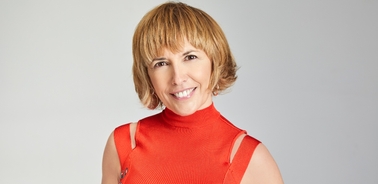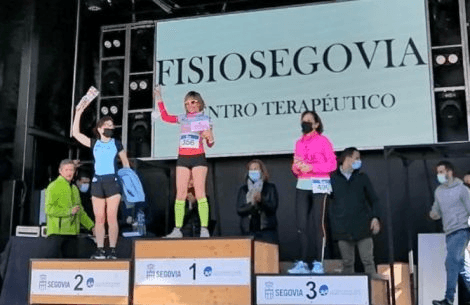- Home
- News And Events
- What’s Going On
- Faculty Spotlight: Margarita Mayo
Faculty Spotlight: Margarita Mayo

Meet one of IE Business School’s most influential thought leaders.
IE Business School’s Leadership and Organizational Behavior Professor Margarita Mayo has made a name as an award-winning author and researcher. Her book, Yours Truly: Staying Authentic in Leadership and Life (Bloomsbury), won the Exceptional Book by a Woman award at the 2019 Business Book Awards in London.
Even before that, though, the Center of Creative Leadership in the United States recognized her as a promising researcher. Most recently she was named to the prestigious Thinkers 50 Radar, a global ranking of management thinkers. The awards reflect an energetic pace of publication in important journals like Harvard Business Review, the Journal of Applied Psychology, Academy of Management Journal, Academy of Management Learning & Education, Organizational Research Methods, Human Resource Management, Leadership Quarterly, and the Journal of Organizational Behavior.
Ever since her arrival at IE in 2000, Mayo also stands out as one of IE’s stellar professors. Her courses on Organizational Behavior, Leadership Development, Teambuilding and Coaching, Managing People and Leading with Purpose are taught across undergraduate and master programs—as well as in-company Executive Education programs-- and have regularly earned her the Teaching Excellence Award.
Meet one of IE Business School’s top thought leaders.
What brought you to IE? Where were you before? And what keeps you here?
Prior to IE, I was an Assistant Professor at Ivey School of Business in London Ontario, Canada doing research on inclusive leadership and teaching courses on organizational behavior and the Harvard case method. I first learned about IE Business School at a conference in Madrid and was very impressed by the international vision of the school when I got the chance to visit it in 2000. I still remember Gonzalo Garland talking about their ambition to become a global university and the plans for growth. It was like having the best of the two worlds – the international professional environment and the Spanish culture. Admittedly, I could not imagine at the time the scale of growth that IE would go on to, so I am very proud to contribute to this institution that has exceeded all expectations. The way that IE has cultivated social sciences has been especially remarkable, which is something I greatly value as a psychologist.
Have you ever had an a-ha moment while teaching that furthered your research? What was it?
Many students still have the mindset of the classical theories of management based on the ideas of bureaucracy and hierarchy. But leadership has nothing to do with titles. I often tell my students that your boss can give you the position, but it is your team that makes you a leader when you gain their trust and respect. So, in my classes I aim to develop their soft skills like critical thinking, active listening, communication, giving and receiving feedback. Analyzing a practical business case, I had an a-ha moment when I asked students to analyze the critical feedback that a manager was giving to his subordinate. In theory, they all identified the dos and don’ts of giving good feedback. However, in practice when I asked them to role-play the feedback, their actions were more in line with the don’ts list than with the best practices. How come they know how to do it, but they are not able to act on it? This teaching experience has furthered my research on the knowing and doing gap in leadership development. This is also an a-ha moment for students who are unaware of this inconsistency. In the classical theories of management, human emotions are ignored. In my research, I study how individuals’ emotions associated with their self-esteem and self-affirmation may interfere with their conscious desire of leadership development, and the best strategies to move from a defensive to a learning or growth mindset.
What book do you wish your students would read before taking your class and why?
I would recommend Thinking, Fast and Slow by Daniel Kahneman, the only psychologist to be a Nobel laureate. When I first encountered his work as an undergraduate, I was fascinated by the practical implications of his work on cognitive heuristics not only for psychology but also for other social sciences like economics and politics. He came to give a talk at Harvard one time and remarked on how our overly-optimistic expectations in academia reflected the concepts of biases that he was studying. It always takes longer than we have anticipated. In his book, Kahneman describes how humans operate with two systems who have been critical to our survival: system 1 is fast and automatic but full of bias and system 2 is slow and conscious but avoids bias. I would like my students to read this book because they will be more prepared to understand about human’s bounded rationality and explore their own unconscious bias.
Please name one of your articles you feel addresses the most important issues in for IE alumni?
My article entitled “If Humble People Make the Best Leaders, Why Do We Fall for Charismatic Narcissists?” in Harvard Business Review explores how to be an effective leader in uncertain times and why personality and personal connections are critical to sustainable success. This might be particularly useful for IE alumni who go on to lead teams, companies, or their own startup. The main idea of the article is that human beings’ hunger for superheroes makes us more likely to choose the wrong type of leader, especially in times of crisis. Although humble people make the best leaders, we appear hardwired to search for superheroes, over-glorifying leaders who exude charisma. I examine the dark side of charismatic leadership as it is associated with narcissistic personality traits, and I like to give managers recommendations that are based on scientific research on effective leadership. Humble leaders have a balanced and healthy view of themselves – both their virtues and limitations and an appreciation of others’ contributions. In doing so, humble leaders improve the performance of a company in the long run because they create more collaborative environments.
Whose research of your IE colleagues do you find interesting? Why?
The research of Antonios Stamatogiannakis on goal setting is very interesting. In a Harvard Business Review article, Antonio and his co-authors discuss Why We Set Unattainable Goals. Although we set goals to give ourselves meaning and purpose, the truth is that only a few of us really achieve the goals we set. For example, they observed that only 19% of people achieve their new year’s resolutions. They contend that the reason we set unattainable goals for ourselves is because it contributes to our psychological well-being. “We want to feel good about ourselves not only in terms of our accomplishments but also in terms of our aspirations.” While stretch goals can be a source of motivation and persistence, people need to learn how to manage failure and develop resilience.
What does Business with Purpose mean to you and how does it apply to your own work?
Business with Purpose means to me how leaders should strive for success, excellence, and constant renewal, while remaining true to oneself. First, I apply this idea of Business with Purpose in my book Yours Truly where I discuss the concept of authentic leadership. Since the financial crisis of 2008, trust in leadership has dramatically decreased. Leadership is more important than ever before, yet true leaders are in short supply. Authentic leaders behave in accord with their own values with a purpose greater than themselves. They are motivated beyond self-interest, keeping in mind the collective well-being. Second, I have developed an executive course “Leading with Purpose” based on these ideas. In this leadership development course, managers learn a toolkit to lead with purpose by leading by biography, embracing their life story, discovering personality, and crafting an uplifting vision that connects people, and gets their commitment.
Tell us one personal thing about yourself that none of your students know. A hobby, sport or talent? Strange fact? Unusual interest?
I learned that it is never too late to start practicing sports. Although I was not much of a sports person, I started training regularly for the three sports of triathlon -swimming, biking, and running. In a Santander Triathlon competition in Valencia, I had my first podium with a second position in my age group. Now running has become my favorite sport. None of my students knew, but just last February while I was teaching in the Segovia campus, I ran the Monumental Race making the first position in my category. I was very happy to accomplish this in my hometown.
